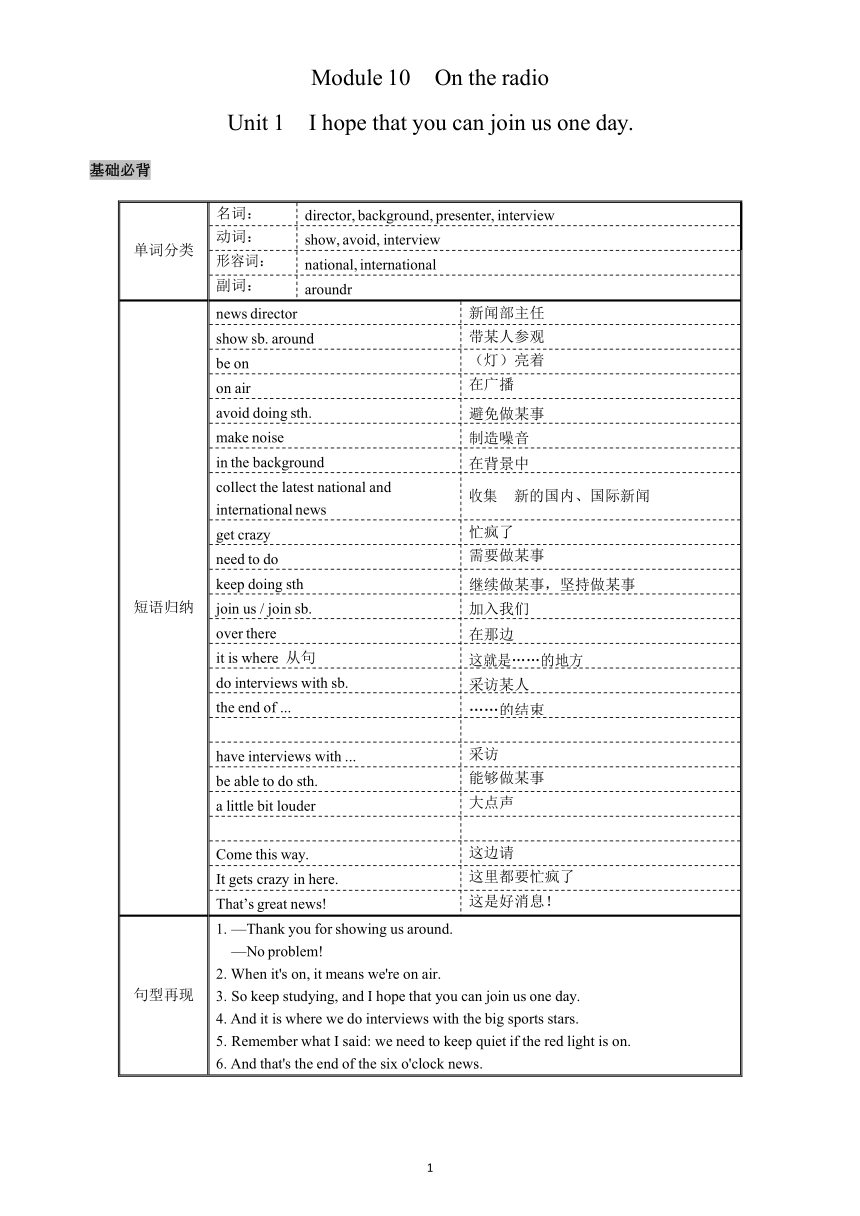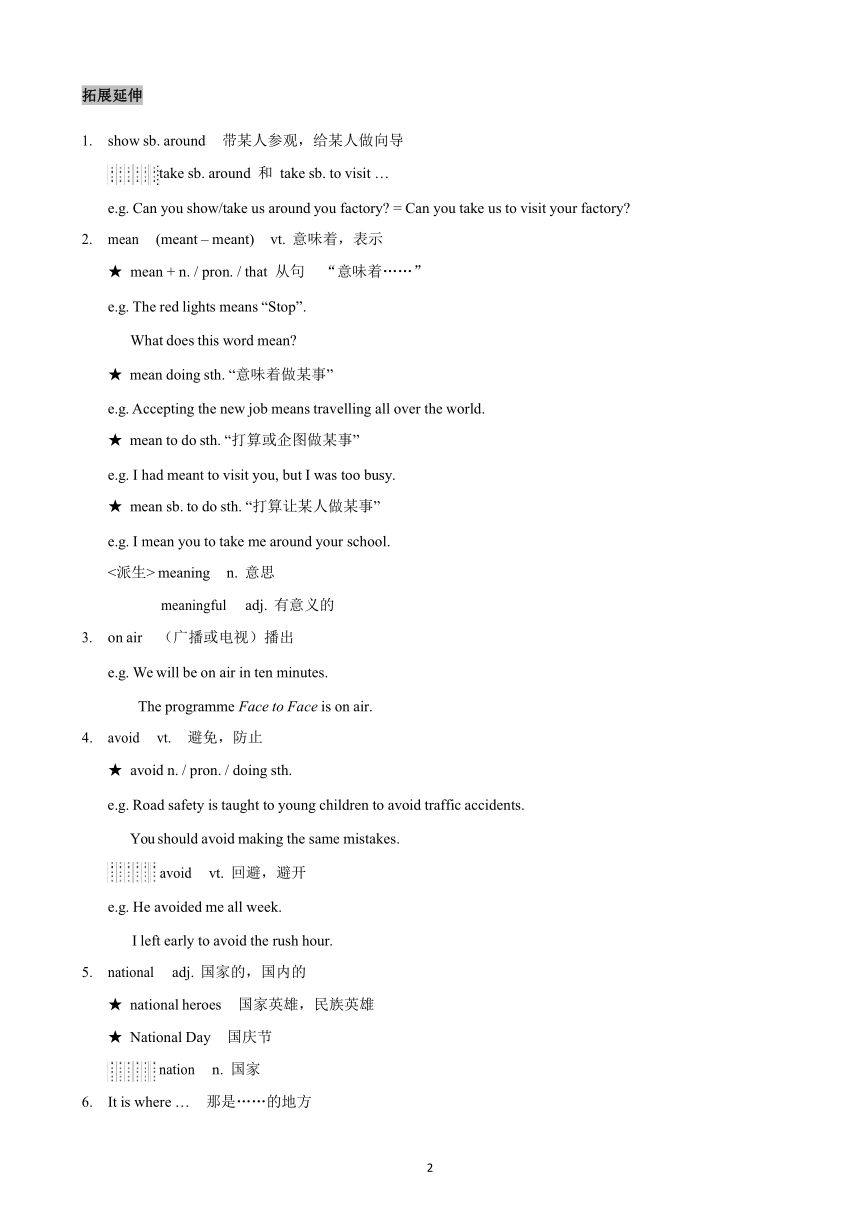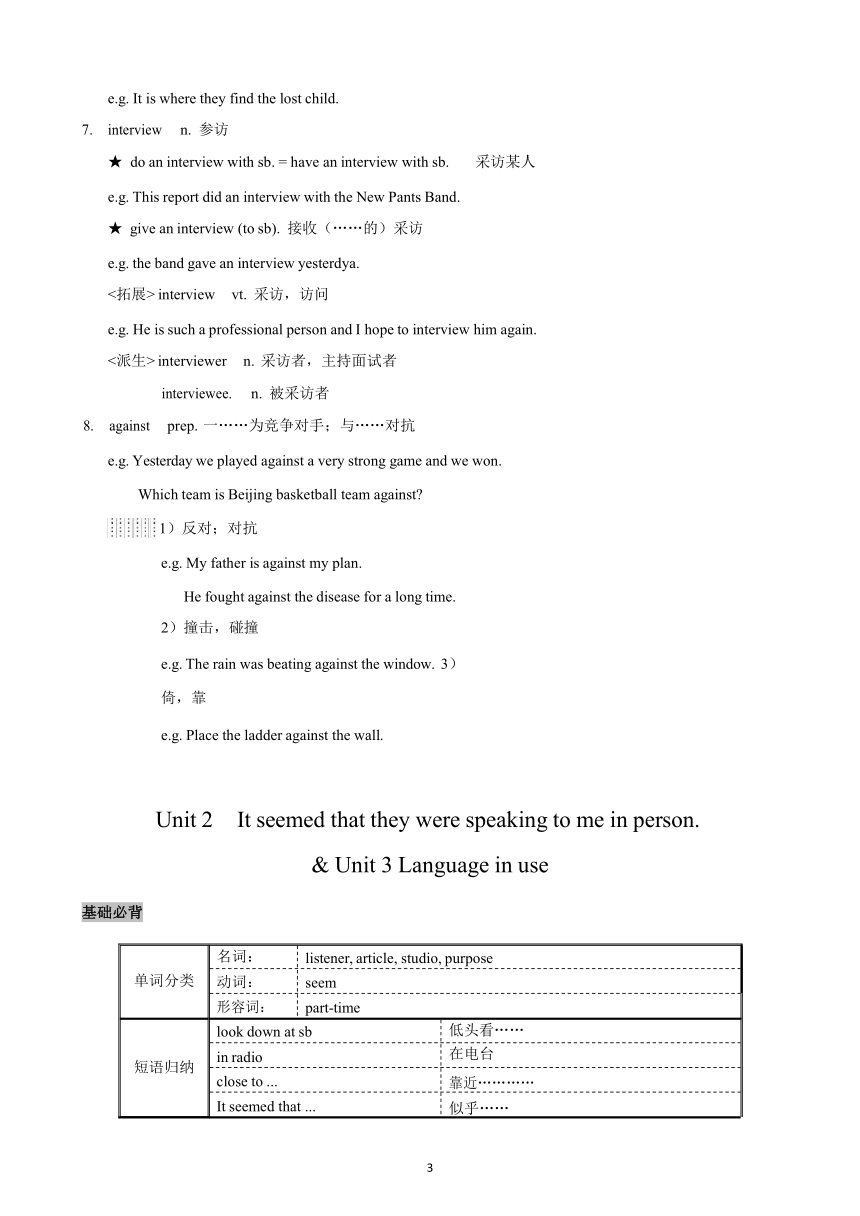外研版八年级英语下册 Module10_模块知识要点教案(WORD版)
文档属性
| 名称 | 外研版八年级英语下册 Module10_模块知识要点教案(WORD版) |

|
|
| 格式 | docx | ||
| 文件大小 | 189.6KB | ||
| 资源类型 | 教案 | ||
| 版本资源 | 外研版 | ||
| 科目 | 英语 | ||
| 更新时间 | 2022-06-16 00:00:00 | ||
图片预览



文档简介
Module 10 On the radio
Unit 1 I hope that you can join us one day.
基础必背
拓展延伸
1. show sb. around 带某人参观,给某人做向导
take sb. around 和 take sb. to visit …
e.g. Can you show/take us around you factory = Can you take us to visit your factory
2. mean (meant – meant) vt. 意味着,表示
★ mean + n. / pron. / that 从句 “意味着……”
e.g. The red lights means “Stop”. What does this word mean
★ mean doing sth. “意味着做某事”
e.g. Accepting the new job means travelling all over the world.
★ mean to do sth. “打算或企图做某事”
e.g. I had meant to visit you, but I was too busy.
★ mean sb. to do sth. “打算让某人做某事”
e.g. I mean you to take me around your school.
<派生> meaning n. 意思
meaningful adj. 有意义的
3. on air (广播或电视)播出
e.g. We will be on air in ten minutes.
The programme Face to Face is on air.
avoid vt. 避免,防止
★ avoid n. / pron. / doing sth.
e.g. Road safety is taught to young children to avoid traffic accidents. You should avoid making the same mistakes.
avoid vt. 回避,避开
e.g. He avoided me all week.
I left early to avoid the rush hour.
national adj. 国家的,国内的
★ national heroes 国家英雄,民族英雄
★ National Day 国庆节
nation n. 国家
It is where … 那是……的地方
e.g. It is where they find the lost child.
interview n. 参访
★ do an interview with sb. = have an interview with sb. 采访某人
e.g. This report did an interview with the New Pants Band.
★ give an interview (to sb). 接收(……的)采访
e.g. the band gave an interview yesterdya.
<拓展> interview vt. 采访,访问
e.g. He is such a professional person and I hope to interview him again.
<派生> interviewer n. 采访者,主持面试者
interviewee. n. 被采访者
8. against prep. 一……为竞争对手;与……对抗
e.g. Yesterday we played against a very strong game and we won. Which team is Beijing basketball team against
1)反对;对抗
e.g. My father is against my plan.
He fought against the disease for a long time.
2)撞击,碰撞
e.g. The rain was beating against the window. 3)倚,靠
e.g. Place the ladder against the wall.
Unit 2 It seemed that they were speaking to me in person.
& Unit 3 Language in use
基础必背
拓展延伸
look down at … 低下头看……
e.g. I looked down at the whole city from the top of the building.
《辨析》look down on sb. 瞧不起某人
look up to sb. 钦佩某人
《拓展》由 look 构成的短语:
look at look to look up
look around look for look after
look forward to look into look out of
Shouldn’t you be at home 难道你不应该上学吗? 否定疑问句,用于表示惊奇的语气。
结构:情态动词(be 动词或助动词)的否定式 + 主语 + 其他? 多用于口语,可表示多种特别的语气:
1)表示惊讶或不快,意为“难道不;难道没”等
e.g. Don’t you see I am busy
Hasn’t he got up It’s ten o’clock.
2)表示说话人预期或希望得到肯定回答
e.g. Don’t you like my new dress
3)表示赞叹或感慨,句子用降调
e.g. Isn’t this book interesting
4)表示批评、厌烦、责备等
e.g. Can’t you see this sign
5)表示较客观地提出请求、邀请等
e.g. Don’t you think we should try again
… I sat close to the radio, listening to my favourite programmes and to the voices of my favourite presenters.
句法分析:现在分词 listening 作状语表示伴随情况。(listen 与主语 I 为主谓关系/ 主动关系)
to my favourite programmes 和 to the voices of my favourite presenters 是并列关系,由 and 连接
e.g. Lily went out, laughing loudly.
Every evening the Greens sit on the sofa, watching TV.
4 seem v. 好像,似乎
★ It seems that 从句
e.g. It seems that she is unhappy.
★ seem to do sth.
e.g. Tom seems to be sleeping. Our team seems to win.
★ seem + 名词/形容词 seem + to be + 名词/形容词
e.g. He seems (to be) happy.
It seems (to be) a foolish decision now.
★ seem like 仿佛,看上去像(后接名词或名词短语)
e.g. It seems like a good idea.
★ seem as if + 句子 看起来好像
e.g. It seems as if it is going to rain. 5 not … but … 不是……而是……
连接两个并列成分;做主语时,采用“就近原则。”
e.g. He goes to school not by bus, but on foot.
Not the twins but Jack has gone to America.
in person 亲自(作状语)
e.g. Her mother will come in person. You can ask my teacher in person.
purpose n. 目的,意图
★ the purpose of / in … ……的目的
e.g. What’s the purpose of your visit
You know my purpose in writing this book.
The purpose of the author is to introduce the university.
★ on purpose 故意,有意地
e.g. He did it on purpose, konwing it would annoy her.
★ for the purpose of … 为了……
e.g. He studied hard for the purpose of getting a better job. 8 close down 停止播音;(工厂等)关闭,停业
9 realise v. 意识到,认识到(常接从句)
e.g. I’m sorry I didn’t realise who you were.
《拓展》v. 实现
e.g. I have realised my dream.
Unit 1 I hope that you can join us one day.
基础必背
拓展延伸
1. show sb. around 带某人参观,给某人做向导
take sb. around 和 take sb. to visit …
e.g. Can you show/take us around you factory = Can you take us to visit your factory
2. mean (meant – meant) vt. 意味着,表示
★ mean + n. / pron. / that 从句 “意味着……”
e.g. The red lights means “Stop”. What does this word mean
★ mean doing sth. “意味着做某事”
e.g. Accepting the new job means travelling all over the world.
★ mean to do sth. “打算或企图做某事”
e.g. I had meant to visit you, but I was too busy.
★ mean sb. to do sth. “打算让某人做某事”
e.g. I mean you to take me around your school.
<派生> meaning n. 意思
meaningful adj. 有意义的
3. on air (广播或电视)播出
e.g. We will be on air in ten minutes.
The programme Face to Face is on air.
avoid vt. 避免,防止
★ avoid n. / pron. / doing sth.
e.g. Road safety is taught to young children to avoid traffic accidents. You should avoid making the same mistakes.
avoid vt. 回避,避开
e.g. He avoided me all week.
I left early to avoid the rush hour.
national adj. 国家的,国内的
★ national heroes 国家英雄,民族英雄
★ National Day 国庆节
nation n. 国家
It is where … 那是……的地方
e.g. It is where they find the lost child.
interview n. 参访
★ do an interview with sb. = have an interview with sb. 采访某人
e.g. This report did an interview with the New Pants Band.
★ give an interview (to sb). 接收(……的)采访
e.g. the band gave an interview yesterdya.
<拓展> interview vt. 采访,访问
e.g. He is such a professional person and I hope to interview him again.
<派生> interviewer n. 采访者,主持面试者
interviewee. n. 被采访者
8. against prep. 一……为竞争对手;与……对抗
e.g. Yesterday we played against a very strong game and we won. Which team is Beijing basketball team against
1)反对;对抗
e.g. My father is against my plan.
He fought against the disease for a long time.
2)撞击,碰撞
e.g. The rain was beating against the window. 3)倚,靠
e.g. Place the ladder against the wall.
Unit 2 It seemed that they were speaking to me in person.
& Unit 3 Language in use
基础必背
拓展延伸
look down at … 低下头看……
e.g. I looked down at the whole city from the top of the building.
《辨析》look down on sb. 瞧不起某人
look up to sb. 钦佩某人
《拓展》由 look 构成的短语:
look at look to look up
look around look for look after
look forward to look into look out of
Shouldn’t you be at home 难道你不应该上学吗? 否定疑问句,用于表示惊奇的语气。
结构:情态动词(be 动词或助动词)的否定式 + 主语 + 其他? 多用于口语,可表示多种特别的语气:
1)表示惊讶或不快,意为“难道不;难道没”等
e.g. Don’t you see I am busy
Hasn’t he got up It’s ten o’clock.
2)表示说话人预期或希望得到肯定回答
e.g. Don’t you like my new dress
3)表示赞叹或感慨,句子用降调
e.g. Isn’t this book interesting
4)表示批评、厌烦、责备等
e.g. Can’t you see this sign
5)表示较客观地提出请求、邀请等
e.g. Don’t you think we should try again
… I sat close to the radio, listening to my favourite programmes and to the voices of my favourite presenters.
句法分析:现在分词 listening 作状语表示伴随情况。(listen 与主语 I 为主谓关系/ 主动关系)
to my favourite programmes 和 to the voices of my favourite presenters 是并列关系,由 and 连接
e.g. Lily went out, laughing loudly.
Every evening the Greens sit on the sofa, watching TV.
4 seem v. 好像,似乎
★ It seems that 从句
e.g. It seems that she is unhappy.
★ seem to do sth.
e.g. Tom seems to be sleeping. Our team seems to win.
★ seem + 名词/形容词 seem + to be + 名词/形容词
e.g. He seems (to be) happy.
It seems (to be) a foolish decision now.
★ seem like 仿佛,看上去像(后接名词或名词短语)
e.g. It seems like a good idea.
★ seem as if + 句子 看起来好像
e.g. It seems as if it is going to rain. 5 not … but … 不是……而是……
连接两个并列成分;做主语时,采用“就近原则。”
e.g. He goes to school not by bus, but on foot.
Not the twins but Jack has gone to America.
in person 亲自(作状语)
e.g. Her mother will come in person. You can ask my teacher in person.
purpose n. 目的,意图
★ the purpose of / in … ……的目的
e.g. What’s the purpose of your visit
You know my purpose in writing this book.
The purpose of the author is to introduce the university.
★ on purpose 故意,有意地
e.g. He did it on purpose, konwing it would annoy her.
★ for the purpose of … 为了……
e.g. He studied hard for the purpose of getting a better job. 8 close down 停止播音;(工厂等)关闭,停业
9 realise v. 意识到,认识到(常接从句)
e.g. I’m sorry I didn’t realise who you were.
《拓展》v. 实现
e.g. I have realised my dream.
同课章节目录
- Module 1 Feelings and impressions
- Unit 1 It smells delicious.
- Unit 2 I feel nervous when I speak Chinese .
- Unit 3 Language in use
- Module 2 Experiences
- Unit 1 I've also entered lots of speaking competi
- Unit 2 They have seen the Pyramids.
- Unit 3 Language in use
- Module 3 Journey to space
- Unit 1 Has it arrived yet?
- Unit 2 We have not found life on any other planet
- Unit 3 Language in use
- Module 4 Seeing the docto
- Unit 1 I haven't done much exercise since I got m
- Unit 2 We have played football for a year now
- Unit 3 Language in use
- Module 5 Cartoons
- Unit 1 It's time to watch a cartoon.
- Unit 2 Tintin has been popular for over eighty yea
- Unit 3 Language in use
- Revision module A
- Module 6 Hobbies
- Unit 1 Do you collect anything ?
- Unit 2 Hobbies can make you grow as a person.
- Unit 3 Language in use
- Module 7 Summer in Los Angeles
- Unit 1 Please write to me and send me some photos
- Unit 2 Fill out a form and come to learn English
- Unit 3 Language in use
- Module 8 Time off
- Unit 1 I can hardly believe we are in the city ce
- Unit 2 We thought somebody was moving about
- Unit 3 Language in use
- Module 9 Friendship
- Unit 1 Could I ask if you've mentioned this to he
- Unit 2 I believe that the world is what you think
- Unit 3 Language in use
- Module 10 On the radio
- Unit 1 I hope that you can join us one day
- Unit 2 It seemed that they were speaking to me in
- Unit 3 Language in use
- Revision module B
